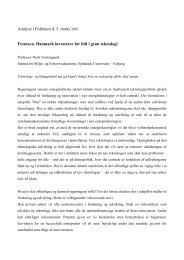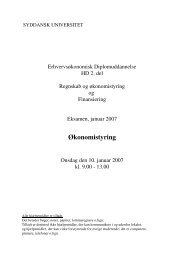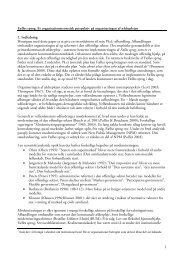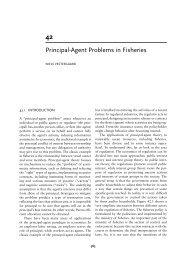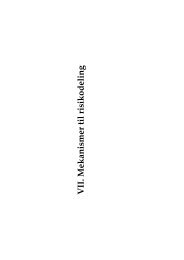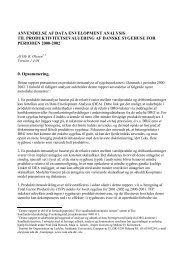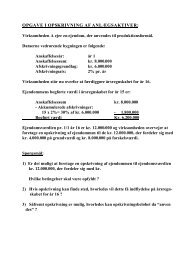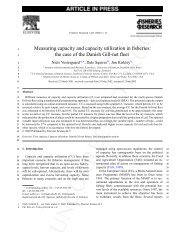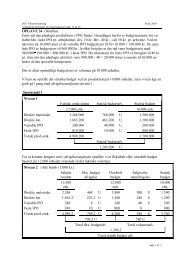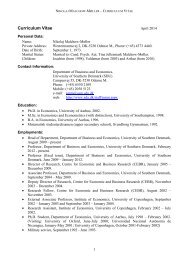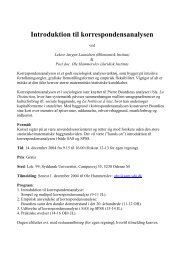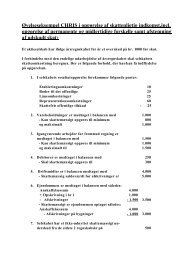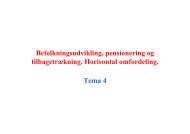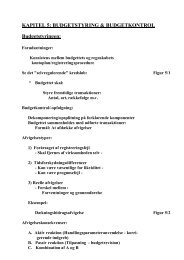Anti-communism has been def<strong>in</strong>ed <strong>in</strong> different ways. Right-liberal parties have primarily paidattention to economic subjects, e.g. the the transition from plan to market, <strong>and</strong> therefore not placedquestions about “lustrace” (“purification”) <strong>and</strong> “dekomunizacji” high on the polical agenda. Thoseparties simply do not recognize their post-communist competitors as legitimate. Opposite, forsocialliberals like Tadeusz Mazowiecki <strong>in</strong> Pol<strong>and</strong> <strong>and</strong> Jiri Dienstbier <strong>in</strong> the Czech Republic thereckon<strong>in</strong>g with the past should be structural, not a question about revenge. Opposite, theconservative-traditionalists talked <strong>in</strong> favour <strong>of</strong> “speed<strong>in</strong>g up” <strong>of</strong> the purification <strong>of</strong> the new wonpost-communist system. In other words, the different op<strong>in</strong>ions about the past were tranfereed to thefuture. In Pol<strong>and</strong> disagreements about the role <strong>of</strong> the Catholic Church seemed to divide the politicalparties more than questions about the economic <strong>and</strong> social policy. The conservative-liberals <strong>and</strong> theconservative traditionalists were deeply divided as regards qustions about state regulation <strong>and</strong> freemarket economy.The conservative-traditionalists can be placed on the political right because <strong>of</strong> nationalistic <strong>and</strong>patriotic slogans <strong>and</strong> semi-authoritharian <strong>and</strong> anti-modernistic attitudes. The political l<strong>in</strong>e wascharacterized by “pragmatization without de-idelogization”. At he same time the conservativetraditionalistsspoke <strong>in</strong> favour <strong>of</strong> more state <strong>in</strong>tervention, a more pro-family policy, more socialjustice <strong>and</strong> expressed a considerable euroscepticism. For the conservative-traditionalists the enemywas not only the “post-communists”, but also so-called “traitors” <strong>in</strong>side their own camp, ma<strong>in</strong>ly theneoliberals <strong>and</strong> EU-federalists. The many “wars <strong>in</strong> the top” <strong>in</strong>side rhe right w<strong>in</strong>g camp <strong>in</strong>evitablyenhanced radicalisation <strong>and</strong> polarisation, especially on the symbolic <strong>and</strong> personal level.Among the national-populists the anti-elite, anti-urban <strong>and</strong> anti-cosmopolitic attitudes were strik<strong>in</strong>g.Inside that group the notion “the people” also had a social mean<strong>in</strong>g, lead<strong>in</strong>g back to the archaicagrarian societys old loyalty to the conservative rul<strong>in</strong>g class. For many national-populists politicswas considered as a “dirty bus<strong>in</strong>ess” based on specific antipolitical feel<strong>in</strong>gs. The support todemocracy was conditional as subjects l<strong>in</strong>ked to moral <strong>and</strong> etics, e.g. questions about abortion, wereplaced “above politics”. Under communism they fought as dissidents for political freedom, but afterthe victory, they did not necessarily love the new won freedom. As politicians many behaved like“amateurs”. However, <strong>in</strong> the longer term the political arena could not be stabilised primarily byidentity based symbolic politics. The fate <strong>of</strong> the governments were determ<strong>in</strong>ed by good or badgovernance <strong>and</strong> the elections became retrospective, not like at the beg<strong>in</strong>n<strong>in</strong>g referenda for or aga<strong>in</strong>stthe new versus the old system.The right-traditionalist parties soon became divided <strong>in</strong> a moderate Christian conservative versus amore uncompromis<strong>in</strong>g fundamentalis w<strong>in</strong>g. The fight between Jozsef Antall <strong>and</strong> Istvan Csurka<strong>in</strong>side the Hungarian Democratic Forum (MDF) <strong>and</strong> the split <strong>in</strong>dside Sajudis <strong>in</strong> Lithuania <strong>and</strong> theUnion <strong>of</strong> Democratic Forces (UDF) <strong>in</strong> Bulgaria can be taken as examples. The black <strong>and</strong> whitejudgments were strik<strong>in</strong>g, not only aga<strong>in</strong>st the “postcommunists”; the “enemy” they found also<strong>in</strong>side own camp. Neoliberalism mostly constituted a political reaction aga<strong>in</strong>st the one party rule<strong>and</strong> the old plan system, transmitted to the CEEC’s from the West <strong>and</strong> only to a small extent rooted<strong>in</strong> the society.1.8. The dilemmas <strong>of</strong> the LeftJust after 1989 the socialist ideology was brought <strong>in</strong> a deep miscredit. The demise <strong>of</strong> communismhad discredited socialism <strong>in</strong> all its variants, that be as a discourse, as an utopia, as a revolution or as24
an <strong>in</strong>spiration for personal emancipation (Schöpfl<strong>in</strong>, 2000:66). The then prevail<strong>in</strong>g neoliberaldiscourse was not seriously challenged. As menioned <strong>in</strong> a round table discussion <strong>in</strong> the Polish daily“Gazeta Wyborcza” the Left simply lacked a new “great vision” for the future post-communistsystem 18 . It was primarily the failures on the Right, that gave the “successor parties” election theelection victories <strong>in</strong> the beg<strong>in</strong>n<strong>in</strong>g <strong>of</strong> the 1990’s. The polical scene had been left over to formerdissidents, right-w<strong>in</strong>g <strong>in</strong>tellectuals, parts <strong>of</strong> the former nomenklatura <strong>and</strong> a empoverished middleclass.Later, hav<strong>in</strong>g passed the “tears <strong>of</strong> valleys” a “retrospective utopia” <strong>and</strong> a “transformation fatigue”emerged, for by many citizens the economic transformation was more felt as a “shock” than a“therapy”. The new order did not as expected necessarily signify law <strong>and</strong> order, economicdevelopment, “catch<strong>in</strong>g up”, better governance, more honesty <strong>in</strong> politics <strong>and</strong>- not to forget- moresocial justice. We must not forget that parties with roots <strong>in</strong> the old system despite a consideraleflight <strong>of</strong> party members ma<strong>in</strong>ta<strong>in</strong>ed old-new networks, more party members than the newmovement parties, higher <strong>in</strong>stitutionalisation <strong>and</strong> f<strong>in</strong>ancial means. However, the postcommunistsuccessor parties had to fight energetically to be recognized home <strong>and</strong> abroad e.g. <strong>in</strong> the socialdemocratic Socialist International (SI).After 1989 the communist successor parties as well as the historical social democratic parties wereforced carefully to th<strong>in</strong>k out the new situation <strong>and</strong> reach new <strong>and</strong> different <strong>and</strong> more feasible“common sense socialism”,. In fact, they did succeed to do that earlier <strong>and</strong> quicker than firstexpected. The ma<strong>in</strong> tast was to free themselves from the “beton” communists <strong>and</strong> appear to theelectorate like authentic, pragmatic, pr<strong>of</strong>essional <strong>and</strong> reformm<strong>in</strong>ded st<strong>and</strong>ard political parties,speak<strong>in</strong>g <strong>in</strong> favour <strong>of</strong> a more socially just <strong>and</strong> more regulated market economy. The formercommunist parties, the reformm<strong>in</strong>ded part <strong>of</strong> the old nomenklatura, chose an expressivelytechnocratic centristic pathway. From the conservative-traditionalistic side, the turn to the leftbasically signified a move towards political economy, nomenklatura capitalism <strong>and</strong> whitewash<strong>in</strong>g<strong>of</strong> black money.The Left has been divided <strong>in</strong> two different groups <strong>of</strong> parties, on the one side traditionalist postcommunistparties stubbornly adher<strong>in</strong>g to the marxist-len<strong>in</strong>ist <strong>and</strong> trade unionist pr<strong>in</strong>cples, <strong>and</strong> onthe other side “modern” social democratic parties stick<strong>in</strong>g to West-European socialliberal values.Follow<strong>in</strong>g the same l<strong>in</strong>e, Krzystyna Skarzynska calls attention to on the one h<strong>and</strong> the economicallyorientated versus the modern identity orientated Left 19 . The first group<strong>in</strong>g has been trade unionistunderl<strong>in</strong><strong>in</strong>g classical well-fare state values, social justice, economic regulation <strong>and</strong> slowprivatisation. The “modern”, technocratic, socialliberal <strong>and</strong> <strong>in</strong>ternational orientated group<strong>in</strong>gappealed primarily to the younger <strong>and</strong> better educated liv<strong>in</strong>g <strong>in</strong> the bigger towns. In other words, themotivation for vot<strong>in</strong>g Left might be based on social or cultural values. Both groups mentionedabove rejected lustrace <strong>and</strong> decomunization. The “modern” left groups first <strong>of</strong> all aimed to br<strong>in</strong>g theproject for modernisation that was <strong>in</strong>troduced by reformm<strong>in</strong>ded communists <strong>in</strong> the late 1980’s tothe end. As we shall see <strong>in</strong> the follow<strong>in</strong>g sections, the two different l<strong>in</strong>es could be found also <strong>in</strong>sidethe parties themselves. The unreformed communist parties failed at the elections if we don’t take<strong>in</strong>to account the rather stable performance <strong>of</strong> the Czech communists (KSCM) at all post-198918 29-30 November, 1997.19 Used by Krzyst<strong>of</strong> Pankowski, <strong>in</strong> “Od lewicowosci zawstydzonej do prawicowosci zagrozonej- zmiany wdeklaracjach politycznych polakow i ciagu ostatnich peiciu lat”, Politicus, no. 1-2(7), Warszawa:Biulet<strong>in</strong> InstitutuStudiów Politycznych PAN, 1995:55.25
- Page 3: “This provisional situation chara
- Page 6 and 7: marketisation and privatisationshor
- Page 8 and 9: purposes, are channels for “expre
- Page 10 and 11: the significance of strategic choic
- Page 12 and 13: presidentialism gave rise to “flo
- Page 14 and 15: antipolitics and reinforcement of a
- Page 16 and 17: In the late 1990’s elections most
- Page 18 and 19: determined primarily by “politica
- Page 20 and 21: politics and antipolitics, all sign
- Page 22 and 23: which attitudes to state regulation
- Page 26 and 27: elections and the Slovak communists
- Page 28 and 29: Cartel agreementsbetter representat
- Page 30 and 31: Basically the absence of clear cons
- Page 32 and 33: After 1989 different types of polit
- Page 34 and 35: complex project for transition unde
- Page 36 and 37: window of opportunity in spite of s
- Page 38 and 39: analyses of party institutionalizat
- Page 40 and 41: political messages and slogans. Thu
- Page 42 and 43: well established party culture may
- Page 44 and 45: expected, much due to the many spli
- Page 46 and 47: Furthermore, the polarisation on el
- Page 48 and 49: Finally, Solidarity can also be con
- Page 50 and 51: whole, on the one side an authorita
- Page 52 and 53: The economic recession and the grav
- Page 54 and 55: election defeat more cooperation an
- Page 56 and 57: The formation of AWS can be conside
- Page 58 and 59: group. RS AWS constituted the Chris
- Page 60 and 61: According to the original plans the
- Page 62 and 63: values. According to Rybicki, as so
- Page 64 and 65: AWS should fight against all types
- Page 66 and 67: 2001 parliamentary election, howeve
- Page 68 and 69: and workers voted ZChN. At the 1993
- Page 70 and 71: The League has been considered as a
- Page 72 and 73: establishment like than LPR’s. Th
- Page 74 and 75:
jobs in rural areas, especially sma
- Page 76 and 77:
industrial policy. According to the
- Page 78 and 79:
pressurizing the government to give
- Page 80 and 81:
democrats, thereby locating itself
- Page 82 and 83:
To conclude, the Freedom Union (UW)
- Page 84 and 85:
Polish middle class. Thus, in Janua
- Page 86 and 87:
such as KSCM and KSS in The Czech R
- Page 88 and 89:
The SLD leaders were mainly recruit
- Page 90 and 91:
the falling popular support for pri
- Page 92 and 93:
innovation was formation of the pol
- Page 94 and 95:
place after talks with each applica
- Page 96 and 97:
Has the Left any freedom of manoeuv
- Page 98 and 99:
medicine, changes in the labour cod
- Page 100 and 101:
The Labour Union (UP), Democratic U
- Page 102:
Nevertheless, before that had taken



